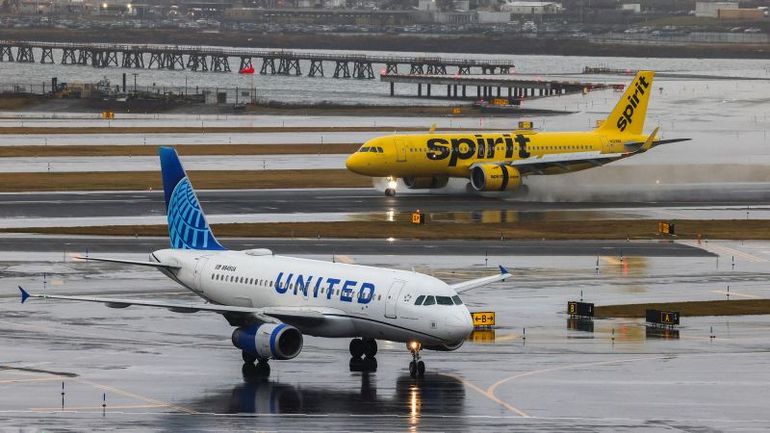
JetBlue cancels acquisition of Spirit Airlines

JetBlue Airways has decided to cancel its agreement to acquire Spirit Airlines, as announced on Monday. The deal between the two airlines has been called off.
JetBlue Airways announced on Monday that it will not be proceeding with its plan to acquire Spirit Airlines. This decision was made after a federal court ruled against the deal due to antitrust concerns. The Justice Department expressed concerns that airfares may increase if Spirit Airlines was no longer operating independently.
Spirit has been a pioneer in the airline industry's low-cost segment, where passengers have to pay extra for everything, including carry-on baggage.
JetBlue has agreed to pay Spirit $69 million as part of its decision to terminate the deal, according to JetBlue.
The companies had appealed the judge's ruling blocking the deal, but JetBlue and Spirit both released statements admitting that they wouldn't be able to overcome the legal obstacles to complete the merger.
JetBlue CEO Joanna Geraghty stated, "Given the hurdles to closing that remain, we decided together that both airlines' interests are better served by moving forward independently."
Spirit is ready to keep operating independently, despite the obstacles the deal encountered. CEO Ted Christie expressed disappointment in not being able to proceed with the deal, but he remains optimistic about Spirit's future as a thriving independent airline.
The judge's decision could potentially trigger a new bidding war for Spirit Airlines. One airline analyst even suggests that this decision could eventually lead to Spirit filing for bankruptcy and liquidation. Spirit has been struggling with losses for years, especially as larger airlines have been able to return to profitability following the pandemic.
JetBlue had hinted at the possibility of backing out of the deal in a filing with the Securities and Exchange Commission back in January, soon after the judge's ruling. It has been evident for quite some time now that Spirit is no longer valued at the $3.8 billion, or $33.50 per share, that JetBlue had initially agreed to pay for the airline.
Even before the federal Judge William Young blocked the deal, the price of Spirit shares had already dropped significantly. In fact, they were trading at half the purchase price or even less over the past six months. Additionally, they were only two-thirds of the price at the time the deal was agreed upon in July 2022.
On Friday, Spirit's shares closed at $6.46 each, resulting in a market cap slightly over $700 million. This marks a 75% decrease from the closing price on the day the deal was first announced. Following the news of the blocked deal, Spirit's shares fell another 10% in premarket trading on Monday. In contrast, JetBlue's shares saw a 3% increase in premarket trading as a response to the deal being called off.
JPMorgan Chase airline analysts think that JetBlue may still be interested in growing, but they probably wanted to back out of the $3.8 billion deal even before the judge's ruling.
According to the analysts at JPMorgan, JetBlue was not ready or willing to go through with the initial deal terms because the price was just too high. They mentioned this in a note on the day of the court's decision.
That section of the note had the headline “JetBlue dodges a bullet.”
What Spirit means for fares on other airlines
The US airline industry has experienced over 20 years of mergers and consolidation leading up to the announcement of this deal.
In 1999, there were 10 major airlines, but they have since merged and combined into four major carriers: American Airlines, United, Delta Air Lines, and Southwest Airlines. These mergers were often completed as part of bankruptcy proceedings. Currently, these four large carriers handle approximately 80% of the nation's air traffic.
The mergers in the US airline industry have made it more profitable, but there are now fewer options for travelers, leading to potentially higher fares.
The Biden administration has been actively opposing mergers and alliances, including in the airline sector. They successfully fought against a merger in court and raised concerns about a partnership between JetBlue and American Airlines, which was eventually abandoned as JetBlue pursued a different deal.
Since Spirit Airlines emerged, the four major US airlines - American Airlines, Southwest Airlines, Delta Airlines, and United Airlines - have introduced a new type of seat on their planes called "basic economy," inspired by Spirit's no-frills approach. However, these airlines still generated a significant portion of their revenue from selling premium seats such as first class, business class, and economy-plus seats.
Despite offering competitive fares, Spirit Airlines consistently received high numbers of customer complaints about their service, as reported by the Transportation Department. Due to its fare system and other challenges, Spirit has struggled to achieve profitability like the larger airlines in the industry.
If analysts are right about Spirit's survival being in question, the airline may face closure, resulting in the loss of 13,000 jobs and potentially higher fares.
This story has been updated with more information and background.
Editor's P/S:
The JetBlue-Spirit Airlines merger saga highlights the complexities and consequences of airline industry consolidation. While the Justice Department's antitrust concerns are understandable, the potential impact on Spirit's independence and the overall airline market is concerning. The loss of Spirit as a low-cost carrier could lead to higher fares for consumers, particularly in the absence of viable alternatives.
The Biden administration's opposition to mergers and alliances in the airline sector is commendable. However, it's crucial to strike a balance between protecting competition and ensuring the long-term viability of airlines. The industry has undergone significant consolidation, and further mergers could exacerbate the problem of limited choice and increased costs for travelers. It remains to be seen how the government will navigate this delicate issue and foster a competitive and sustainable airline market in the future.










